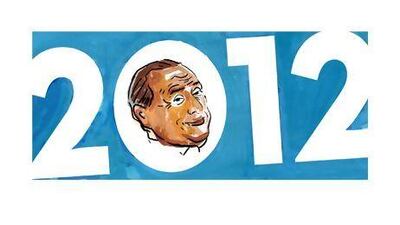It is traditional at this time of year to indulge in a spot of list-making, remembering those who excelled, those who inspired and, sadly, those who expired.
Time magazine devotes an entire issue every December to the contenders for its "person of the year". Last year, to mark the political ruptures sparked by the Arab Spring and the "global wave of dissent" that fanned out from the region, the publication found in favour of The Protester. This year, citing his ability to find a new majority and his ambition to "create a more perfect union", Time has awarded its title to Barack Obama, who sought and sealed re-election in the US earlier this autumn.
It is the second time in five years that Obama has been given such an accolade, but there is a precedent for such a president: his White House predecessors George W Bush, Bill Clinton, Ronald Reagan, Richard Nixon, Lyndon B Johnson, Dwight Eisenhower and Harry S Truman have all been crowned twice, while Franklin D Roosevelt picked up the award a record three times.
Obama joins a short list of double winners that also includes the former Soviet leader Mikhail Gorbachev, the late British prime minister Winston Churchill, General George Marshall, the architect of the aid programme that helped Europe recover after the end of the Second World War and, intriguingly, the despot Joseph Stalin.
Silvio Berlusconi, the former Italian prime minister, is unlikely to join such lofty company at Time's top table, but it would be hard not to applaud (grudgingly or otherwise) the unlikely political comeback he has begun to engineer in the past month.
Berlusconi spent most of 2011 mired in a succession of political scandals that appeared to leave his career so badly damaged he might never recover.
Il Cavaliere (The Knight) was finally ridden out of office in November 2011 amid catcalls and demonstrations that could be heard around the world. As Italy's economy became further mired in the economic swamp that threatened to overwhelm southern Europe, Berlusconi's political obituary was drafted and nailed to the wall.
This year started equally inauspiciously. Berlusconi's seeming preference for debauched private parties and his entwinement with Karima El Mahroug, the young Moroccan woman known to the world as Ruby the Heartstealer, has dragged him through the Italian judicial system throughout 2012. The court case involving the pair is due to restart at the end of January.
Ever a man to defy convention, Berlusconi, 76, has recently announced his engagement to Francesca Pascale, 27, (he is separated but not finally divorced from his second wife) and has also confirmed his intention to run for prime minister in next year's general election, which will be held in February.
He says the ongoing economic situation demands that he seek office (for a fourth time) to save his nation from the perils of the more popular left-of-centre parties. Few experts give Berlusconi much hope of actually winning that race but, equally, who really gave him a chance of ever returning to government after being replaced by Mario Monti last year?
When he first became Italy's prime minister in 1994, Berlusconi told the press that the nation had "rewarded the life story of this man … people don't believe in political parties any more, they want men of calibre to believe in". In a political world dominated by personality rather than policy, that much remains true, although whether he is still a man of calibre will be up to the Italian electorate to decide.
nmarch@thenational.ae

Berlusconi might not be person of the year, but comeback is impressive
Time magazine has made US President Barack Obama its "person of the year" for the second time. If we doled out such awards, who would we choose?
Most popular today

